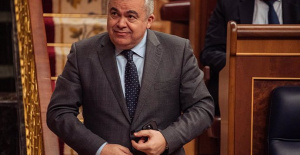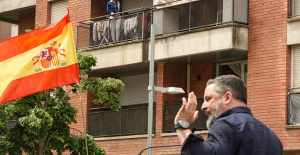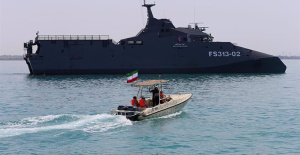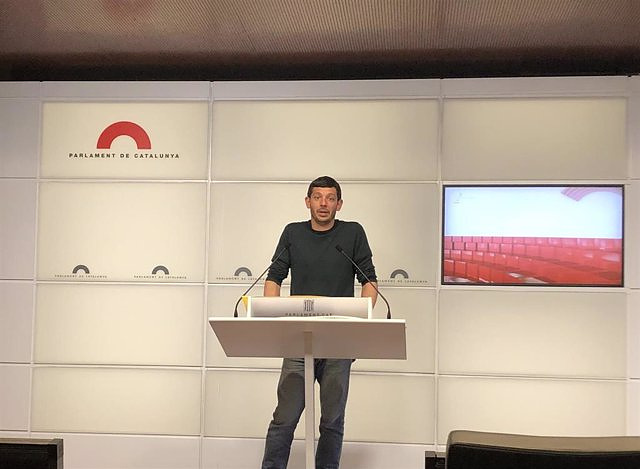The Criminal Chamber indicates that he has the right to access the investigation even if the case was provisionally filed for him
MADRID, 14 Feb. (EUROPA PRESS) -
The Criminal Chamber of the National Court has agreed that the spokesman for the pro-independence group 'Alerta Solidària' and CUP deputy in Parliament, Xavier Pellicer, has access to the case for which 12 members of the Defense Committees of the Republic (CDR) for belonging to a terrorist organization.
This is agreed in an order by the Chamber, to which Europa Press has had access, in which it is pointed out that contrary to the refusal of the instructor, Manuel García Castellón, Pellicer has the right, like all investigated, to access "all the elements of the cause". He indicates that this is included in article 6 of the Criminal Procedure Law and the European Convention on Human Rights.
From Solidarity Alert they point out in a press release that it was last October when Pellicer's defense requested to know all the information about what they describe as an "espionage plot" against 37 CDR activists and the Catalan pro-independence left that would have had place between 2018 and 2019.
They indicate that the purpose of the appearance was to find out if Pellicer - for whom the National Court has already filed the case - continued to be under the magnifying glass of the investigator, the reasons and what his procedural situation was.
Now, the Second Section of the Criminal Chamber recalls that Pellicer asked to appear in person after having been investigated "with measures (...) such as wiretapping, data and calls received and issued by telegram, WhatsApp or other messaging without until now having been made aware of its existence".
In the specific case, the Chamber adds, one cannot lose sight of "the appellant's right to know the content of the proceedings now dismissed due to the fact that proceedings 99/18 were derived from them, in which proceedings are currently being investigated together with other people".
It points out that on this point "the legitimate interest of the appellant to know its content must be affirmed on the basis of his right to defense, since the current criminal case against him originated precisely from there."
He thus rebuts the instructor by pointing out that access to the case cannot be conditioned on the situation of the criminal case, in this case in a state of dismissal. "The person investigated has the right to know the origin of the actions against him, their legality, or even proceed to challenge them at the appropriate procedural moment," he indicates.
Thus, it stresses that "it must be remembered that after five years from the start of proceedings 104/2017, more than enough time has elapsed so that once they have been completed, the appellant can know their content."
And he says that there is also the circumstance that these proceedings "have justified the initiation of the current criminal case for which he has been investigated, especially when the agreed file has been provisional."
From Solidarity Alert they indicate that in this way they will finally have access to the information that is at the origin of the investigations that they describe as "prospective". "We believe that we have once again achieved a small judicial victory on the tortuous path of defending ourselves against an illegitimate State, which acts by all means to curb the aspirations for freedom of our people," they point out.
This setback to the instructor's position is added to that of January 2022, when the Criminal Chamber sided with members of the CDR linked to 'Operation Judas' and urged the judge to deliver the orders for which they authorized the wiretapping, as well as the original audios, considering it "legitimate" that they wanted to know this material as part of their right to defense.
In that order of January 10, to which Europa Press had access, the Criminal Chamber thus agreed to some of the requests made by Jordi Ros and Queralt Casoliva, two of the thirteen CDRs processed.
The magistrate had denied the requests of Ros and Casoliva, arguing that they did not sufficiently explain the "purpose" of the same, as well as that the main piece - from which the piece emanated for which the instructor has placed them one step away from the bench -- was still being investigated.
It was in September 2021 when the judge, following the criteria of the Prosecutor's Office, prosecuted the thirteen CDRs for belonging to a terrorist organization and nine of them were also charged with the crime of possession, deposit and manufacture of explosive and flammable substances or devices of a nature terrorist.
In the indictment, the judge indicated that this group formed within the CDRs the so-called Tactical Response Team (ERT), a cell made up of a radicalized nucleus made up of individuals from different CDRs.
The creation of the ERT would be motivated by the need to have within the CDRs a clandestine group made up of highly trusted individuals who would show themselves totally devoted to "the cause" in order to entrust them with the most sensitive actions.
All those investigated, pointed out the instructor, shared ideological principles and objective: to achieve the independence of Catalonia, using violence in its maximum expression.
According to the judicial report, the members of the ERT would have had an active participation in some of the most forceful actions that the CDR have carried out to date, such as cutting roads, erecting toll barriers or pouring oil on the section of the C -55 where the procession that transferred those convicted of the 'procés' from the Lledoners prison had to pass.
They would also have ambitious plans. Thus, they would have assumed the order that they supposedly received from the so-called 'Catalan CNI' to provide the necessary logistical infrastructure to occupy the Parliament of Catalonia, defend it once taken and remain there for at least a week.
In addition to the Parliament, they had other targets in their sights. They had carried out surveillance, photographs and videos of various facilities, such as the Naval Command, the Military Government and the Government Delegation of Barcelona and the Prosecutor's Office of the Superior Court of Justice of Catalonia.
All in all, the instructor highlighted that they would have exceeded the CDR to the point of configuring "a parallel terrorist organization, of a clandestine and stable nature, whose objective would be to carry out violent actions or attacks against previously selected targets using explosives and/or substances to do so. incendiaries manufactured in the two clandestine laboratories that the organization itself had installed in two private homes".

 Exploring Cardano: Inner Workings and Advantages of this Cryptocurrency
Exploring Cardano: Inner Workings and Advantages of this Cryptocurrency Seville.- Economy.- Innova.- STSA inaugurates its new painting and sealing hangar in San Pablo, for 18 million
Seville.- Economy.- Innova.- STSA inaugurates its new painting and sealing hangar in San Pablo, for 18 million Innova.- More than 300 volunteers join the Andalucía Compromiso Digital network in one month to facilitate access to ICT
Innova.- More than 300 volunteers join the Andalucía Compromiso Digital network in one month to facilitate access to ICT Innova.-AMP.- Ayesa acquires 51% of Sadiel, which will create new technological engineering products and expand markets
Innova.-AMP.- Ayesa acquires 51% of Sadiel, which will create new technological engineering products and expand markets Cerdán censures the "dirty war" of the right and calls for a debate around "democratic regeneration"
Cerdán censures the "dirty war" of the right and calls for a debate around "democratic regeneration" 12M.- Abascal (Vox) proposes "massive deportations" in the face of illegal immigration
12M.- Abascal (Vox) proposes "massive deportations" in the face of illegal immigration The campaign reaches the halfway mark marked by Sánchez's reflection and with Illa first in polls
The campaign reaches the halfway mark marked by Sánchez's reflection and with Illa first in polls Iran sends 'Shahid Mahdawi' beyond the equator in first long-distance mission by a warship
Iran sends 'Shahid Mahdawi' beyond the equator in first long-distance mission by a warship How Blockchain in being used to shape the future
How Blockchain in being used to shape the future Not just BTC and ETH: Here Are Some More Interesting Coins Worth Focusing on
Not just BTC and ETH: Here Are Some More Interesting Coins Worth Focusing on A sensor system obtains the fingerprint of essential oils and detects if they have been adulterated
A sensor system obtains the fingerprint of essential oils and detects if they have been adulterated Faraday UPV presents the 'Origin' rocket to exceed 10 km of flight: "It is the beginning of the journey to space"
Faraday UPV presents the 'Origin' rocket to exceed 10 km of flight: "It is the beginning of the journey to space" The Generalitat calls for aid worth 4 million to promote innovation projects in municipalities
The Generalitat calls for aid worth 4 million to promote innovation projects in municipalities UPV students design an app that helps improve the ventilation of homes in the face of high temperatures
UPV students design an app that helps improve the ventilation of homes in the face of high temperatures A million people demonstrate in France against Macron's pension reform
A million people demonstrate in France against Macron's pension reform Russia launches several missiles against "critical infrastructure" in the city of Zaporizhia
Russia launches several missiles against "critical infrastructure" in the city of Zaporizhia A "procession" remembers the dead of the Calabria shipwreck as bodies continue to wash up on the shore
A "procession" remembers the dead of the Calabria shipwreck as bodies continue to wash up on the shore Prison sentences handed down for three prominent Hong Kong pro-democracy activists
Prison sentences handed down for three prominent Hong Kong pro-democracy activists ETH continues to leave trading platforms, Ethereum balance on exchanges lowest in 3 years
ETH continues to leave trading platforms, Ethereum balance on exchanges lowest in 3 years Investors invest $450 million in Consensys, Ethereum incubator now valued at $7 billion
Investors invest $450 million in Consensys, Ethereum incubator now valued at $7 billion Alchemy Integrates Ethereum L2 Product Starknet to Enhance Web3 Scalability at a Price 100x Lower Than L1 Fees
Alchemy Integrates Ethereum L2 Product Starknet to Enhance Web3 Scalability at a Price 100x Lower Than L1 Fees Mining Report: Bitcoin's Electricity Consumption Declines by 25% in Q1 2022
Mining Report: Bitcoin's Electricity Consumption Declines by 25% in Q1 2022 Oil-to-Bitcoin Mining Firm Crusoe Energy Systems Raised $505 Million
Oil-to-Bitcoin Mining Firm Crusoe Energy Systems Raised $505 Million Microbt reveals the latest Bitcoin mining rigs -- Machines produce up to 126 TH/s with custom 5nm chip design
Microbt reveals the latest Bitcoin mining rigs -- Machines produce up to 126 TH/s with custom 5nm chip design Bitcoin's Mining Difficulty Hits a Lifetime High, With More Than 90% of BTC Supply Issued
Bitcoin's Mining Difficulty Hits a Lifetime High, With More Than 90% of BTC Supply Issued The Biggest Movers are Near, EOS, and RUNE during Friday's Selloff
The Biggest Movers are Near, EOS, and RUNE during Friday's Selloff Global Markets Spooked by a Hawkish Fed and Covid, Stocks and Crypto Gain After Musk Buys Twitter
Global Markets Spooked by a Hawkish Fed and Covid, Stocks and Crypto Gain After Musk Buys Twitter Bitso to offset carbon emissions from the Trading Platform's ERC20, ETH, and BTC Transactions
Bitso to offset carbon emissions from the Trading Platform's ERC20, ETH, and BTC Transactions Draftkings Announces 2022 College Hoops NFT Selection for March Madness
Draftkings Announces 2022 College Hoops NFT Selection for March Madness























